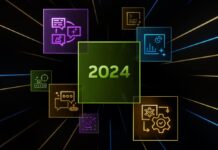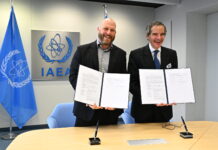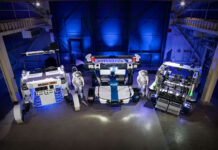Exploring the Transformative Impact of AI in Science: Insights from the AI for Science Forum
Recently, London played host to the inaugural AI for Science Forum, an event co-organized by Google DeepMind and the Royal Society. This pioneering forum gathered Nobel laureates, esteemed members of the scientific community, policymakers, and industry leaders to delve into the transformative potential of Artificial Intelligence (AI) in driving scientific breakthroughs. The discussions emphasized how AI could address some of the world’s most pressing challenges and usher in a new era of discovery.
James Manyika, Google’s Senior Vice President for Research, Technology, and Society, delivered the opening keynote at the forum. His address highlighted the significant impact AI has had on science and traced its roots back to early AI researchers like Alan Turing. Manyika emphasized that the excitement surrounding AI in science stems not from the idea of AI replacing scientists but as a powerful tool aiding scientific endeavors. The computational techniques enabled by AI allow scientists to tackle complex problems more effectively.
One early example of AI’s assistive potential was the Nobel Prize-winning work of Hodgkin and Huxley in 1963. They used computational approaches to understand how nerve impulses travel along neurons. Fast forward to the present, and the remarkable work of Demis Hassabis, John Jumper, and the AlphaFold team at Google DeepMind has made headlines. They recently won the Nobel Prize in Chemistry for solving the “protein-folding problem” that had puzzled researchers since the 1970s.
How AI is Revolutionizing Scientific Research
AI is revolutionizing the pace and scope of scientific research. In certain fields, AI is enabling researchers to condense centuries of research into mere years or even months. This acceleration is a result of AI’s ability to process vast amounts of data quickly and its capacity to analyze multiple variables simultaneously. As a result, researchers can explore scientific questions in ways that were previously unimaginable.
Moreover, AI is democratizing access to scientific insights, empowering more individuals to contribute to research efforts. This expanded participation is driving rapid scientific discoveries and advancements.
AI’s Landmark Contributions Across Disciplines
AI’s influence spans various scientific disciplines, with AlphaFold being a prime example. Within a year, the AlphaFold team predicted the structure of over 200 million proteins known to science. Their work has extended beyond proteins to include life’s biomolecules such as DNA, RNA, and ligands. AlphaFold has become an indispensable tool for over two million researchers in over 190 countries, aiding in research on neglected diseases, drug-resistant bacteria, and more.
Another notable advancement is AlphaMissense, an extension of AlphaFold. It classifies nearly 90% of 71 million possible missense variants, which are single-letter substitutions in DNA, as likely pathogenic or benign. In contrast, human experts have confirmed only 0.1% of these variants in detail.
When the human genome was first sequenced, it represented a single genomic assembly. However, Google Research, in collaboration with academic partners, recently released the first draft reference human pangenome. This new reference is based on 47 genomic assemblies, offering a more comprehensive representation of human genetic diversity.
In the field of neuroscience, Google Research collaborated with the Max Planck Institute and the Lichtman Lab at Harvard to produce a nanoscale map of a piece of the human brain. This groundbreaking project unveiled previously unseen structures in the brain, potentially reshaping our understanding of neurological diseases like Alzheimer’s.
AI is also making strides in climate science. Google DeepMind’s NeuralGCM combines machine learning with traditional physics-based models to simulate the atmosphere more accurately and efficiently. NeuralGCM can simulate over 70,000 days of atmospheric conditions in the time it would take traditional models to simulate just 19 days. Similarly, GraphCast, another AI model, predicts weather conditions up to 10 days in advance with remarkable accuracy and speed.
In the realm of quantum computing, Google’s Quantum AI team is exploring questions that once belonged to the realm of science fiction. Their research on traversable wormholes is paving the way for testing quantum gravity theories initially proposed with the Einstein-Rosen bridge nearly 90 years ago.
Real-World Impact of AI-Enabled Scientific Advances
Beyond groundbreaking discoveries, AI is delivering tangible benefits in areas such as climate adaptation and healthcare. For instance, AI-powered flood forecasting is addressing the urgent challenge of riverine flooding caused by climate change. The Flood Hub, an early-warning platform initially piloted in Bangladesh, now covers over 100 countries and serves 700 million people.
In aviation, contrails contribute significantly to global warming. Google Research developed an AI model to predict contrail formation, and in collaboration with American Airlines, tested it on 70 flights. The result was a 54% reduction in emissions, showcasing AI’s potential for climate mitigation.
AI is also making strides in disease detection. For example, Google’s AI-based screening tool accurately interprets retinal scans to detect diabetic retinopathy, a preventable cause of blindness affecting millions. This tool has been used in over 600,000 screenings worldwide, with new partnerships in Thailand and India set to enable six million screenings over the next decade.
The Path Forward: Challenges and Opportunities
Despite the significant progress made, the journey of integrating AI into scientific research is just beginning. To fully harness AI’s potential, several key areas require attention. First, addressing AI’s current limitations and enhancing its capabilities is crucial. AI should be able to assist in developing novel scientific concepts, theories, and experiments.
Second, a sustained commitment to the scientific method and responsible AI usage is essential. Collaboration among scientists, ethicists, and safety experts is vital to address risks unique to scientific applications, such as biosecurity threats and data bias.
Lastly, it is imperative to make AI-enabled research tools and resources accessible to scientists worldwide. Ensuring that scientific progress benefits people globally is a priority.
As we embark on this new era of discovery, there is much potential for collaboration and innovation. By building AI tools that advance science, we can collectively work towards benefiting society as a whole. The forum in London showcased the remarkable progress made so far and laid the foundation for exciting future developments in AI-driven scientific research.
For more Information, Refer to this article.


































